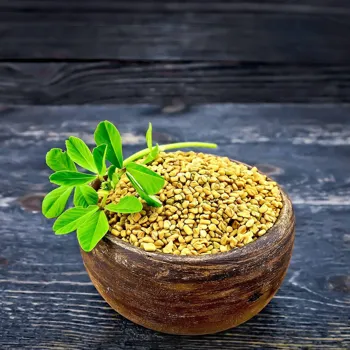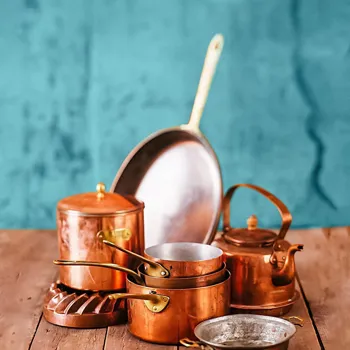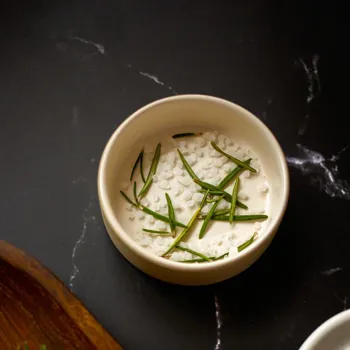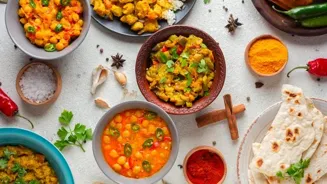Unveiling the essence of authentic Indian cooking - 7 must-have ingredients to elevate your culinary journey. Explore more!
Namaste, food lovers! Are you wanting to cook Indian food at home that tastes
just like what you get in your favourite restaurants or maybe even like your grandmother used to make? The secret isn't just a complicated recipe, but having the right ingredients.
Indian food is all about the flavour, and it comes from a combination of fresh things and pantry staples. Here are seven must-have ingredients that will help you on your journey to becoming an Indian cooking pro.
These are the real deal, the things that will take your food from good to absolutely amazing. Get ready to fill your kitchen with these essential flavours to discover a world of taste and traditional goodness.
Indian spices like turmeric, cumin, and coriander add flavor and health benefits to dishes
First and foremost on our list is the aromatic world of Indian spices, starting with turmeric. Turmeric, with its bright yellow colour and slight bitter flavour, is a cornerstone of Indian cooking. It’s used not only for adding colour to dishes but also for its amazing health benefits.

It has anti-inflammatory and antioxidant properties, so it's good for your body too! You'll find that turmeric is in almost every dal, curry, and vegetable dish. Next on the list includes cumin, as an essential spice!
Cumin, whether used as seeds or ground, has a warm, earthy flavour that deepens the taste of many dishes. It's often toasted before being added to a recipe, which brings out its flavor even more. Cumin is important in everything from biryanis to raitas, adding a comforting touch.
Lastly, we have coriander which offers a fresh, citrusy flavour. There are 2 forms of these fragrant spices. The seeds lend a warm flavor when toasted, while the fresh leaves are used as a garnish and add a burst of freshness to every bite.
Using a mix of these spices will give you a great foundation.
Asafoetida, or hing, enhances flavor and aids digestion in cooking
Asafoetida, also known as hing, is another important ingredient. This pungent resin has a strong smell which might be slightly off-putting at first, but its flavour transforms when cooked, adding a unique savoury note, similar to onion and garlic.
A little goes a long way; just a pinch can make a big difference in dishes like dal, sambar, and vegetable curries. Asafoetida is also known for its digestive benefits, so it’s an excellent addition for those who may have difficulty digesting certain foods.
It balances the flavor in a dish, adding a depth that's hard to describe but instantly recognizable. It's especially favored by people who avoid onion and garlic, as it provides a similar flavor element, enriching a dish.
Also, remember to store it properly in an airtight container, away from moisture, to maintain its potency!
Lentils and beans: versatile heroes in Indian cooking, rich in protein and fiber
Next up is the world of lentils and beans! Lentils and beans are the unsung heroes of vegetarian Indian cooking, adding nourishment and are very versatile.
There is a huge variety available, each with its unique flavor and texture like toor dal (split pigeon peas), which is important for sambar, and urad dal (black lentils), which is the main ingredient in dal makhani. Moong dal (yellow split lentils) is used for lighter, everyday dals.
Chickpeas, or chana, are used in chana masala. Then kidney beans, also known as rajma, is for rajma chawal. Each of these lentils and beans needs different cooking times and preparation methods, such as soaking beforehand, but the effort is well worth it.
They are all packed with protein and fibre, making them an excellent and very filling addition to the diet!
Ghee is a must-have for authentic Indian flavor and health benefits
Ghee is definitely another ingredient you will want in your pantry for a more authentic flavour! Ghee, or clarified butter, is a must-have ingredient in Indian cooking. It has a rich, nutty flavour that enhances the taste of any dish.

You can use it for sautéing spices, cooking dals, or drizzling over roti. It has a high smoke point, making it perfect for high-heat cooking. You can find ghee in shops or even make it at home by melting butter and separating the milk solids.
Some people believe in Ayurveda and its impact, noting that ghee is considered to be beneficial for health, promoting digestion and the overall well-being. It adds a comforting richness to food, the kind that makes you want to eat more and more.
Indian cooking trio: ginger, garlic, green chillies; vital flavors for curries, dals, veggies
Fresh ginger, garlic, and green chillies are the flavour trio you often witness in Indian cooking. This combination forms the base for many curries, dals, and vegetable dishes. They add warmth, sharpness, and aroma that elevates the entire dish.
Ginger has a slightly spicy, refreshing taste, garlic adds a pungent depth, and green chillies bring the heat. The proportion of each ingredient can be adjusted to suit your preferences. Simply crush or chop the ginger and garlic together to make a paste and finely chop the green chillies.
This paste can then be fried in ghee or oil at the beginning of cooking to release its amazing flavors. You'll be shocked at how much difference these 3 basic ingredients will give to your dish.
Yogurt: versatile ingredient in Indian cuisine, marinating, tenderizing, gut health
Last but not least, is yogurt. Yogurt is frequently used in Indian cooking for marinating, making raitas, and adding a slight tang to curries. It also helps to tenderize pieces of vegetables, making them super soft and easy to eat.

Plain yogurt is the best choice as you can season it according to your taste. In marinades, yogurt helps to break down proteins, resulting in a more flavorful and tender dish. It can be whipped with spices and herbs to make raita, a cooling accompaniment.
Adding a spoonful of yogurt to a curry at the end of cooking can add richness and slight acidity. Yogurt is also great for a healthy gut, adding probiotics to your diet. With its versatility, yogurt is an invaluable ingredient in Indian kitchens.














